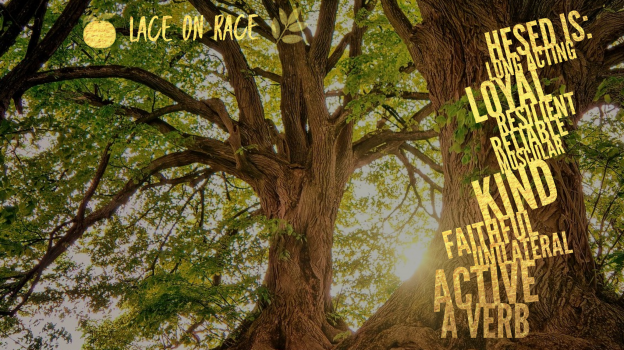HESED:
“Translated as “loving-kindness,” chesed isn’t just an emotion—it’s a kind of action we take to help those who are physically or emotionally in need. And it generally involves more than simply writing a check or sending flowers. It’s often about showing up for people when they’re suffering and offering what chaplains refer to as “the ministry of presence.” When others are at their most vulnerable—when they’re sick, in mourning, or otherwise struggling—Judaism doesn’t tell us, “Awkwardly avoid them because they make you uncomfortable, and maybe just send an email.” We’re told, “Show up for them, and do whatever you can to make them feel loved.”
8 NIGHTS, 8 JEWISH VALUES: REFLECTIONS FOR CHANUKAH ON THE JEWISH OBLIGATION TO BUILD A BETTER WORLD by Sarah Hurwitz
This last night is where everything all ties together. All of the lessons of Sarah’s folded together in the absolute cornerstone of the foundation of Lace on Race. Ms. Hurwitz spoke to Hesed (Chesed) on Third Night, but because it is oh so very important to us here, I reserved it for last.
Again, I want to be sure to stress that I hold no disagreement with Ms. Hurwitz; quite the contrary, her focus on those in need is foundational.
But as is how we do, I also want to look a bit deeper at just who it is who is ‘physically or emotionally in need’. It’s all of us. All of us have buckets of slosh, some dumped into our buckets by the world, some of it self administered and hoarded. None of us are easy to love in the Hallmark Channel kind of treacly and easy-to-swallow way.
It is not fair, but often, when we are at our worst places–as Ms. Hurwitz says, ‘when [we’re] sick, in mourning, or otherwise struggling–that is when the world so often sees us as the most unlovable. When we are inwardly (or outwardly) howling, and acting out, and forgetting all of the skills and virtues we have learned, it is so easy–all too easy–to declare the one in pain irredeemable.
But, no.
Hesed is loving kindness, yes, but to my mind, and to how we use it here in Lace on Race, it is so much more. In our communal orchard, hesed is:
Long Acting
Loyal
Resilient
Reliable
Muscular
Kind
Faithful
Unilateral
Active
A Verb
So loving kindness, yes, but with our signature seasoning of *relentlessness*. For us, as we learn hesed for ourselves, for our community, for the Other, hesed is first and last. It is a love that wears overalls and workboots; a love not afraid to get dirty and messy in the orchard, a love that spreads good compost, a love that endures.
When I think of some other core values of Lace on Race, the two that spring to mind are accountability (of course), and our signature sauce, kind candor.
With the kind of muscular love we are talking about here, as well as the level and depth of love I am inviting and exhorting you to enter into and to live out, accountability is a non-negotiable. There is no way we can do this work alone, or without someone walking beside us, as a co-guide. We need to learn to both give and accept kind candor; we must learn how to course correct eye to eye, we must learn how to do the work of repair, and we must always remember why we chose to embark upon this journey.
Earlier this year, I wrote in an essay something about the concept of ‘saying ‘yes’ first’.
That holds here, and I think it holds for every significant relationship we have (and, never forget, every relationship, if we allow it to be, holds significance)–saying ‘yes’ first.
Not ‘until’. Not ‘unless’, Not ‘only if’
The world would have us always with one hand with fingers crossed behind our backs when we make promises and commitments. I challenge that, and I challenge you to challenge that.
Opting in is a yes. One that cannot be coerced or pressured into, but a yes freely given. Hesed is embedded in that yes, and it would behoove us to remember those bullet points every time we enter this space, as we remember who it is we are choosing to walk and abide with.
This Hesed infuses our Five Tenets of Leaning In, Planting Roots, Growing Up and In to Grow Out. The Tenets are tenacious.
When I see Hesed in the Other’s eyes, I know I have found one of my people.
Sue Johnson, another author we will be diving into in 2021, says the central query for individuals in dyadic relationships, and we will adapt it for groups, the central query is ‘will you be there for me when I need you?’
Rarely will that utterance be said aloud nor will it likely be said that baldly. But it will be said.
One of the reasons we here at LoR hit so hard on the kind of love that goes the distance and that can be depended upon and trusted in: resilience, reliability, and relentlessness is that dominant culture is pretty shaky when it comes to those virtues. Which is to say, it is shaky on hesed.
To become 10,000 people for whom it is safe for all others to rest their feet when they are sore requires heaping helpings of Hesed.
And so I wish for you, to make, to share, and to receive.
I offer you my arms, my back, my heart, and my gut. I humbly ask the same of, and for you.
To Hesed.
And the flames flicker out on the Eighth Day.

Leave a Reply